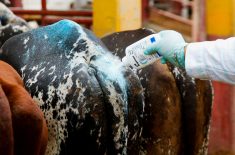The federal government plans to put “special agricultural safeguards,” a form of duty allowed by the World Trade Organization, around Canada’s supply-managed dairy, egg and poultry sectors.
Agriculture Minister Gerry Ritz announced Thursday that the government has served the WTO with notice of Canada’s intent to proceed with “finalizing the operationalization” of special agricultural safeguards for supply-managed goods.
The last WTO Agreement on Agriculture provides for these “special” safeguards. Unlike normal safeguards in other sectors, the special ag safeguards can be triggered automatically when volumes of over-quota imports of certain goods rise unexpectedly above a certain level, or if prices of those certain goods fall unexpectedly below a certain level.
Read Also

B.C. ostriches now to be culled after ruling: CFIA
Birds are now to be culled from a British Columbia ostrich operation that sought to bypass standard federal practice in on-farm outbreaks of highly pathogenic avian influenza and has been denied an appeal at Canada’s highest court.
Also, unlike with normal safeguards, a government doesn’t have to demonstrate that serious injury is being caused to the domestic industry to set up a special ag safeguard.
According to the WTO, such safeguards can only be used on products that are tariffed, and not on imports that come in below a country’s tariff quota. They can also only be used if a government reserves the right to do so as part of its schedule of WTO commitments on agriculture, as Canada plans to do in this case.
Ritz said in a release Thursday that the decision to put these safeguards in place “will ensure that we can stay in position to support supply management sectors, and keep them strong.”
According to the WTO, “relatively few” such safeguards are used in practice. So far, 39 WTO members have special ag safeguards on over 6,000 types of products. Canada has them on 150 — mostly dairy goods, livestock and animal products, and cereal products. The U.S., by comparison, has 189. Switzerland and Liechtenstein between them have 961. Each country’s definition of a certain “product” may vary.
In the current round of WTO agriculture talks, some countries have called for the special agricultural safeguard system to be abolished, while others proposals call for it be used only by, or excluded from use by, developing countries.
According to the WTO, some among the safeguards’ supporters see them as “permanently necessary” while others see them as a way to boost individual countries’ confidence and encourage them to lower their tariffs.










